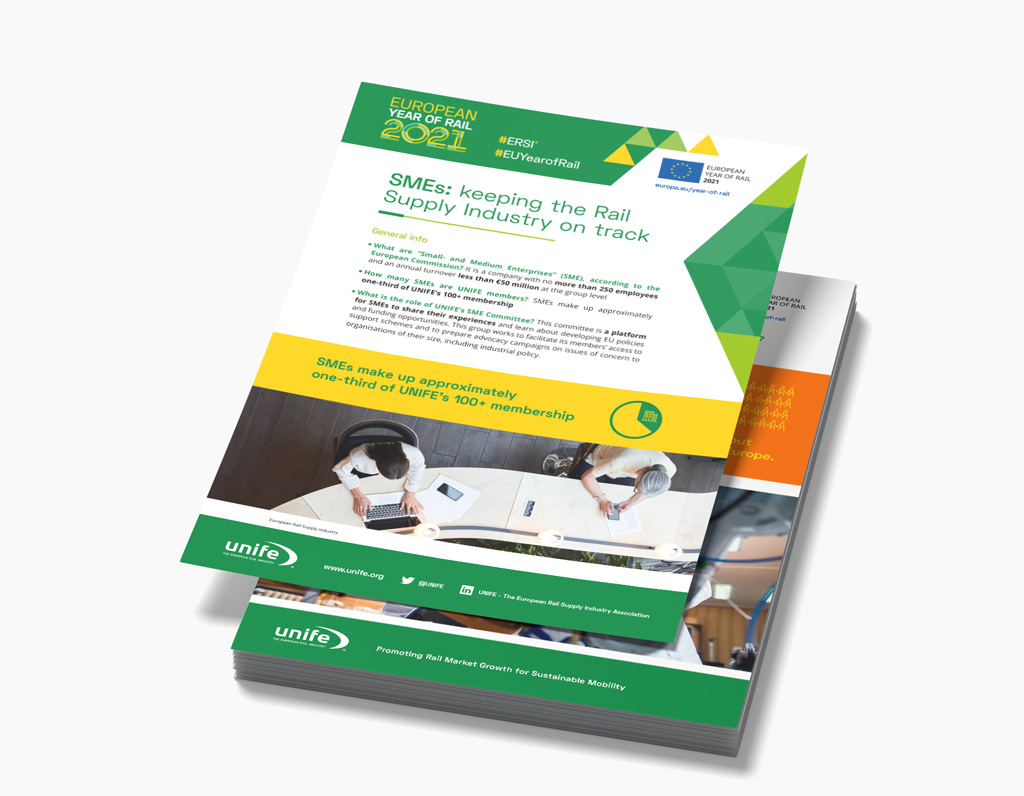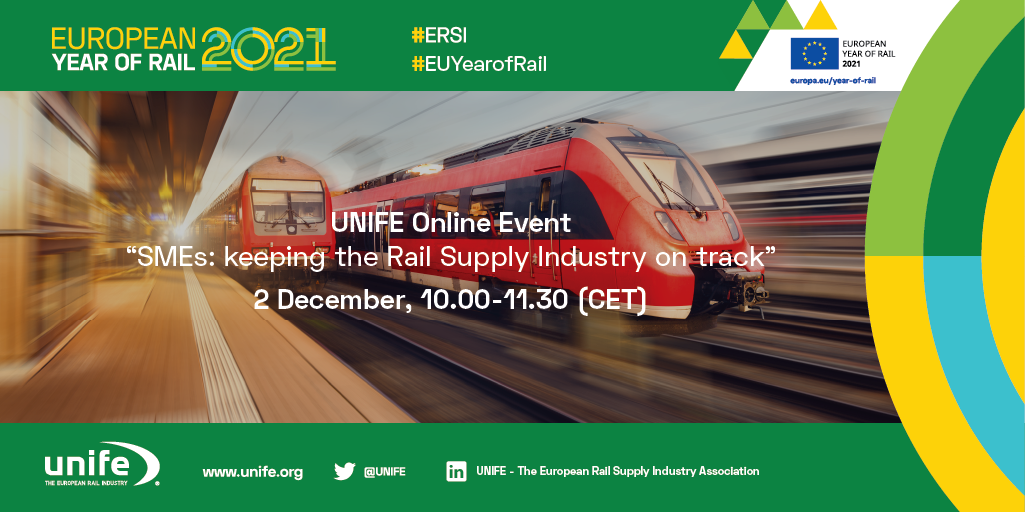Interactive Factsheet
SMEs: keeping the Rail Supply Industry on track
General info
- What are “Small- and Medium Enterprises” (SME), according to the European Commission? It is a company with no more than 250 employees and an annual turnover less than €50 million at the group level
- How many SMEs are UNIFE members? SMEs make up approximately one-third of UNIFE’s 100+ membership
- What is the role of UNIFE’s SME Committee? This committee is a platform for SMEs to share their experiences and learn about developing EU policies and funding opportunities. This group works to facilitate its members’ access to support schemes and to prepare advocacy campaigns on issues of concern to organisations of their size, including industrial policy.
SMEs make up approximately
one-third of UNIFE’s 100+ membership
How are SMEs central to the European Rail Supply Industry’s success?
According to the European Commission:
- The rail supply industry (RSI) is a crucial component of European industrial growth, jobs and innovation.
- RSI manufactures locomotives and rolling stock, tracks, electrification, signalling and telecommunication equipment, parts, services.
- Both SMEs and major industrial leaders are active in the sector. European RSI invests 2.7% of its annual turnover in Research & Innovation (R&I) and represents 46% of the world RSI market.
- RSI employs about 400,000 people in Europe. The railway sector, overall, – including operators and infrastructure – accounts for more than 1 million direct, and 1.2 million indirect, jobs in the EU.
RSI employs about 400,000 people in Europe.
In September 2019, an European Commission Study on the
competitiveness of the Rail Supply Industry found that:
- In 2018, there were 1,831 companies active within Europe connected to rolling stock and locomotives, approximately 16% of which were SMEs.
- For rail infrastructure, a high degree of specialisation is needed – as of 2018 only 350 companies active in Europe were able to conduct this type of work and 17% of them were SMEs. A high number of components are being produced locally (e.g., rails, fastenings, sleepers, etc.) but only high value components are mainly produced in the EU.
- The European signalling and electrification technology markets are rather fragmented and served by various companies. That same year, 344 companies were operating in this space in Europe; of these 21% were SMEs.
- SMEs continue to represent a fundamental source of innovation, capabilities, and highly specialised workers within the larger manufacturing segment of the economy. Cooperation between large companies and SMEs increased, according to this study, which can lead to benefits for both parties.
- Large companies benefit from SMEs through the innovative solutions they provide and their specific expertise. In contrast, SMEs benefit from access to important projects, contracts, and/or investments as subcontractors. They can also allow major companies to cover the commercialisation aspects of the new solutions developed, which often presents a substantial challenge for most SMEs. However, access to financing to promote R&I projects, as well as intellectual property rights (IPR) protection when conducting business abroad, are two additional for SMEs. It is, in particular, German and French companies that lead EU stakeholders in receiving newly granted patents and registered industrial designs. Globally, Chinese and Japanese companies are the most intensive regarding IPRs.
- According to interviews conducted with SMEs and larger companies, the former represents a clear added value for the European rail supply industry. Over the past few years, they have increasingly gained more importance and visibility in the sector, becoming some of the key players for both competitiveness and innovation. Furthermore, partnerships between large companies and SMES have become more popular as both parties normally benefit from the cooperation.
In 2018, there were 1,831 companies active within Europe connected to rolling stock and locomotives, approximately 16% of which were SMEs.
- Nowadays, SMEs are becoming more specialised within the rail sector. This has allowed them to deliver highly customised products to the client or end-user by leveraging their specific capabilities to deliver innovative solutions in a short time span. For larger companies, this typically takes longer due to the greater number of internal procedures and more complex decision-making processes for new investments. Therefore, the SMEs’ more agile approach also benefits the larger companies as they can incorporate new products into their portfolio quicker through strategic partnerships with these smaller outfits.
- SMEs might also allow major companies to cover the commercialisation aspects of the new solutions developed, as the commercialisation phase is normally a difficult for businesses of this size.
- In general, third market accessibility is essential for European SMEs. Notably, this is due to the EU market’s relatively limited size and slower growth when compared to some third markets that are currently expanding their rail networks. Nevertheless, one of the main barriers to internationalisation are the requirements often set by local/national tendering authorities which require the engagement of local SMEs for the provision of rail supplies. Although partnerships with large players can support the SMEs to explore new markets, the above-mentioned local requirements within tenders can be restrictive and hinder collaboration with SMEs. Stakeholders also highlighted that European international hubs, such as IPR Helpdesk, were useful in making SMEs feel more “protected” within European facilities, rather than relying on local private consultants, which can be risky.
- According to the Shift2Rail Joint Undertaking, the participation of SMEs in the S2R calls jumped from 108 (i.e., 24% of the participating entities) in 2016 to 120 (26% of entrants) in 2017.
Recommendations
Based on the analysis of the case study, the following recommendations are proposed:
- Cooperation between SMEs and the promotion of partnerships between them and large companies should be encouraged, leading to more innovation with more appeal and higher foreign competitiveness. Building up an effective SME network or clusters could increase knowledge sharing, information exchanging and increase the visibility of SMEs.
- National credit agencies should be flexible when applying the minimum national content (of the crediting agency’s country) rule to avoid limiting the participation of SMEs in tendering opportunities of third countries which would require specific partnerships between the SMEs and local companies.
- Continue investing in European international hubs to support SMEs abroad.
- To further support cooperation within the sector in the field of innovation, cooperation between SMEs, and the promotion of partnerships between SMEs and large companies should be encouraged; leading to more innovation with more appeal and higher foreign competitiveness. The aim should be to build up an effective SME network or clusters; which could increase the sharing of knowledge, exchange information, and increase the visibility of SMEs.
Information on EU support for SMEs
InvestEU
The InvestEU fund will mobilise public and private investment through an EU budget guarantee of €26.2 billion. This envelope will back the investment projects of the European Investment Bank (EIB) Group and other financial partners while increasing their risk-bearing capacity. The EU budgetary guarantee is distributed across four policy windows:
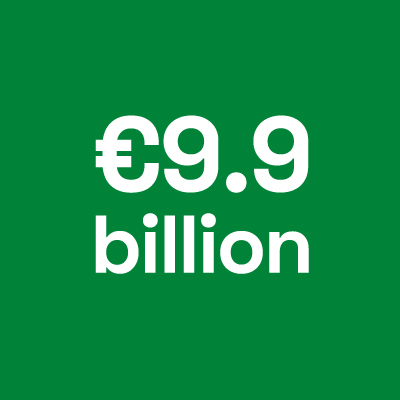
1. Sustainable Infrastructure:
This segment is meant to finance projects in sustainable energy, digital connectivity, transport, the circular economy, water, waste, other environment infrastructure and more.
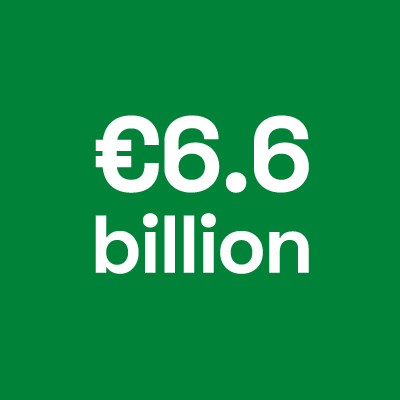
2. Research, Innovation and Digitisation:
€6.6 billion in the second window is dedicated to research and innovation, taking research results to the market, digitisation of industry, scaling up larger innovative companies, artificial intelligence and more.
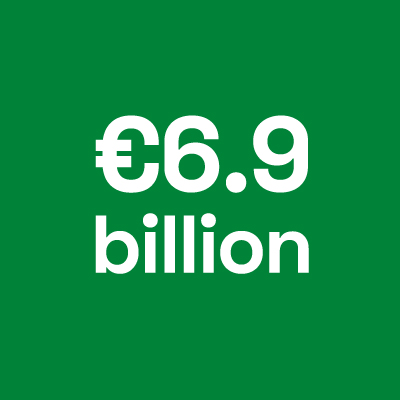
3. SME:
€6.9 billion InvestEU has dedicated a portion of the fund to easing access to finance for small and medium-sized companies (SMEs), small mid-cap companies. This includes capital support for SMEs that were negatively affected by the COVID-19 crisis.
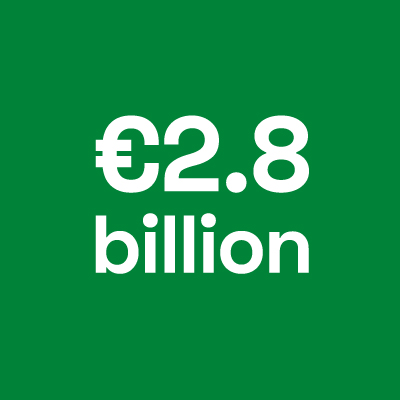
4. Social Investment and Skills:
€2.8 billion The final allotment aims to support projects in skills, education, training, social housing, schools, universities, hospitals, social innovation, healthcare, long-term care and accessibility, microfinance, social enterprise, integration of migrants, refugees and vulnerable people, and more.
EU Single Market Programme
The €1 billion SME pillar of the Single Market Programme will primarily ensure the continuity of the implementation of the EU programme for the Competitiveness of Enterprises and Small and Medium-sized Enterprises’ (COSME) most impactful actions of. In particular, it seeks to support better access to markets, a more favourable business environment and the promotion of entrepreneurship. The programme is designed to foster the competitiveness, capacity building and sustainability of enterprises – especially SMEs – including those operating in the tourism sector.
It will implement the SME strategy in the context of industrial ecosystems, the SME components of the Industrial Strategy and the Small Business Act (SBA). The EU Single Market Programme takes into due account the current circumstances in which SMEs operate, as described by the SME Performance Review and the considerations of the SME Envoy Network.
Featured programmes & initiatives
- Enterprise Europe Network
- European Clusters Collaboration Platform
- Erasmus for Young Entrepreneurs
- Intelligent Cities Challenge
- EU SME Centre in China
- Advanced Technologies for Industry
- Intellectual Property Helpdesk
- European Light Industries Innovation and Technology (ELIIT) project
- Your Europe Business
- Technical Assistance Facility (TAF) for Industrial Modernisation and Investment
- Worth Partnership Project
- EU-Japan Centre for Industrial Cooperation
The InvestEU fund will mobilise public and private investment through an EU budget guarantee of €26.2 billion.

